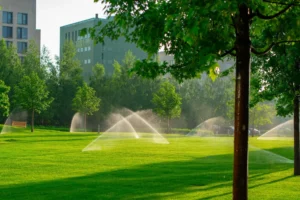Sprinkler System Maintenance : A Primer for MEP Professionals

A sprinkler system maintenance in MEP projects is an important safety feature in contemporary buildings, which is intended to regulate or put out fires effectively. Regular maintenance guarantees the system operates at its best when it is necessary. For MEP construction professionals, sprinkler system maintenance is a necessary aspect of providing secure, compliant, and long-lasting infrastructure.
Sprinkler systems in MEP engineering
Under the MEP in engineering, sprinkler systems are part of the “mechanical” component of Mechanical Electrical & Plumbing design. They need to be integrated flawlessly with electrical and plumbing systems to run successfully. A system that has not been properly maintained might fail at the time of emergencies, so regular inspection and maintenance is non-negotiable.
Important Steps to Maintain Sprinkler Systems
1. Routine Inspection
Inspect sprinkler heads for corrosion, leaks, or clogging.
Make sure valves are fully functional and accessible.
Check control panels and alarms as part of MEP works to ensure responsiveness of the system.
2. Cleaning and Testing
Clean sprinkler pipes and heads to eliminate dust or debris.
Perform flow testing to ensure proper water pressure.
Run simulated fire tests periodically to ensure operational readiness.
3. System Upgrades
Upgrade old sprinkler heads with new, efficient ones.
Install smart sensors and automated monitoring for effective maintenance.
Schedule upgrades in coordination with MEP civil engineering staff to prevent structural clashes.
4. Documentation and Compliance
Keep accurate records of inspections, repairs, and replacements.
Meet local codes and standards to maintain compliance.
Work with MEP construction staff to integrate maintenance schedules into building operations.
Why Sprinkler System Maintenance Matters
An effective sprinkler system limits property damage, increases occupant safety, and reduces liability risks. Through strategic MEP services, facility engineers and managers maximize mechanical electrical & plumbing systems, including sprinklers, to fully function and be code-compliant.
Conclusion
Sprinkler system maintenance is not a technical necessity—it’s a mandate. For MEP professionals in engineering, incorporating the practice of maintenance into the building life cycle is essential. With proper care and routine maintenance, system longevity is enhanced, safety is enhanced, and professionalism is upheld as expected in contemporary MEP civil engineering projects.
Regular maintenance of sprinkler systems is essential to ensure safety and efficiency in contemporary buildings. In MEP construction and MEP civil engineering, it is a top priority to ensure that mechanical electrical & plumbing systems run without interruption. Regular inspection, cleaning, testing, and upgrades via professional MEP services not only increase the length of system life but also adhere to standards of safety, thus making sprinkler maintenance imperative in MEP in engineering projects.


